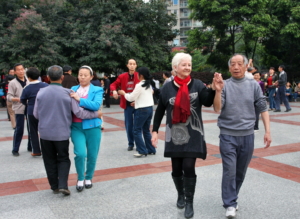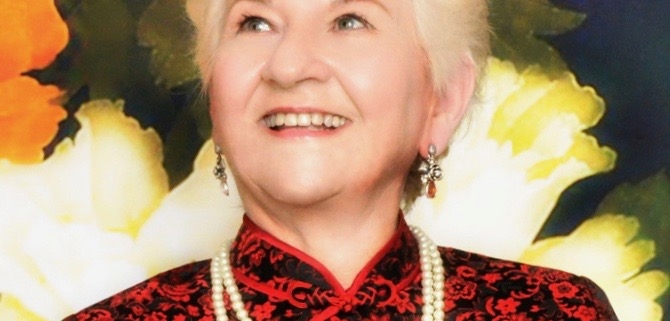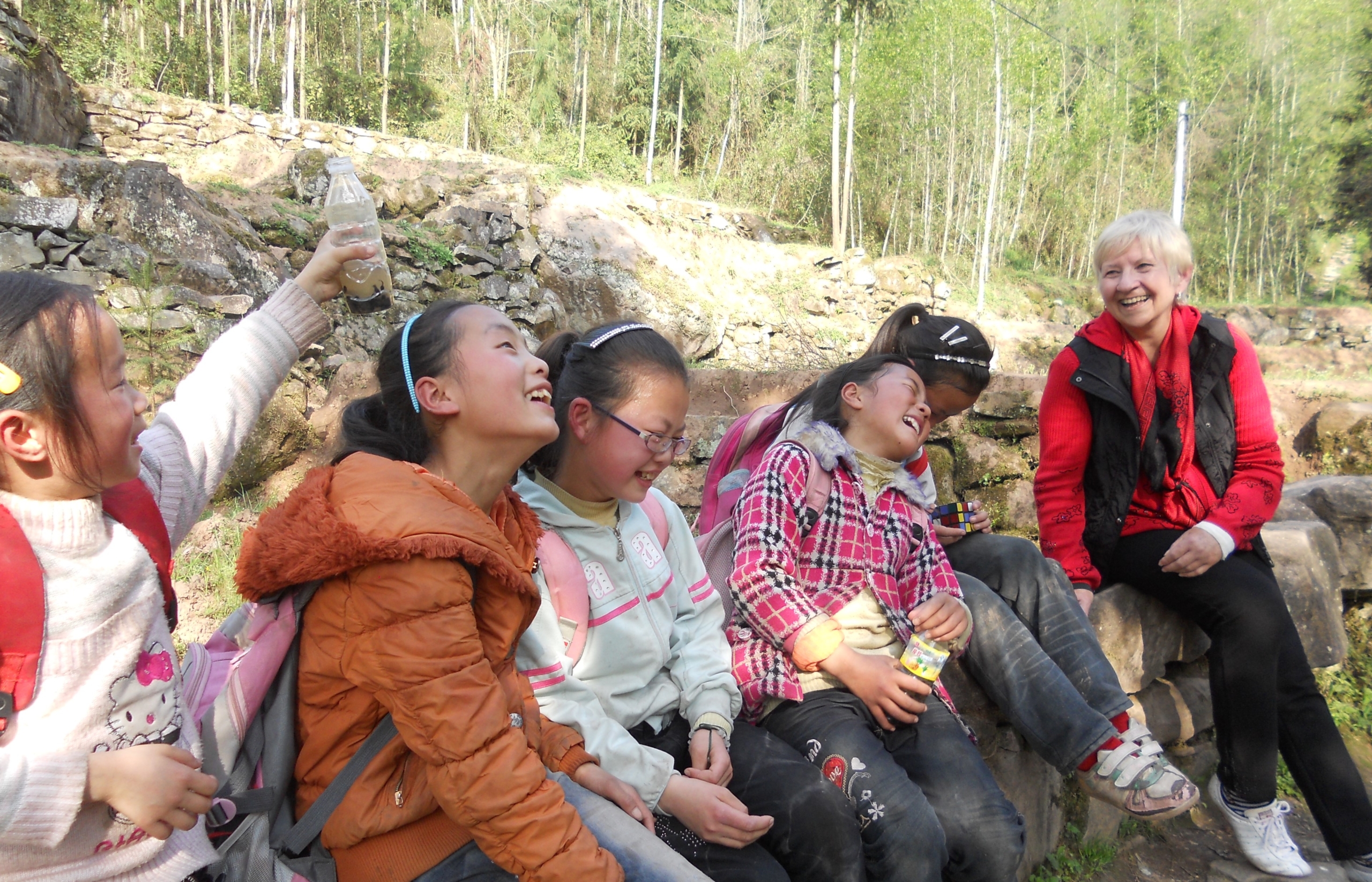Lorna Bergner
This Granny Went to China
By: Lorna Bergner
The music was blaring, people of all ages and backgrounds were dancing. I said to my new Chinese friend, “Let’s go closer.” We joined the huge crowd of people who had gathered in a large circle to watch the hundreds of dancers—in one section many couples were dancing, and right next to that group were lines and lines of people following a leader doing exercises to the same music. I was fascinated and started tapping my toes to the lively tunes. My friend said, “Do you want to dance?” “I would love to,” I said, “but I don’t know how.” She called to one of the ladies and asked her if she would teach me. Fortunately, I was able to follow her lead.

There I was, 65 years young, within a week after arriving in Chongqing, dancing in the public square in Yangjiaping, a major commercial center in that huge metropolis. Prior to my arrival there, I had visited several cities, such as Beijing, Shenzhen, Zhuhai, Kunming, Chengdu and finally, Chongqing. All along the way, I had been accompanied by someone who could speak both English and Chinese. Normally, I would try to master a few basic phrases of the local language; however, I landed in mainland China during Spring Festival 2008 on a whim. The only words I knew were “Nǐ hǎo” (hello), and soon understood that most people greeted me by saying “Nǐ chī fàn le ma” (Have you eaten?).
During my brief visits to the homes of Chinese families in the cities just mentioned, my heart was completely won over by their sincerity, respect, generosity, intelligence, and desire to be of service. I decided to stay in Chongqing for an indefinite time so that I could immerse myself in the language and culture of the people. No longer accompanied by a bilingual friend, I realized that my first priority, after getting a place to stay, was to learn Chinese. Meanwhile, a local family unofficially “adopted” me, and included me in all their family gatherings and holiday trips to their hometown and nearby tourist sites. It was Chinese New Year Festival—the Year of the Rat—twelve years ago. None of the family spoke English, except for the 15 year-old daughter who tried to talk to me using her few words of English. We managed to convey our ideas through gestures, dictionaries, and mainly heart-to-heart. On those road trips, I learned “Cè suǒ zài nǎ lǐ? (Where is the toilet?)
With the help of this family and so many other Chinese friends, who I feel honored to call sister, brother, auntie, uncle, daughter, son, granddaughter, grandson, I stayed in Chongqing. I worked as a teacher of English at a private language school. I knew I would not become wealthy by working as a part-time English teacher, and I received no perks, such as free housing or travel allowances. However, because I worked part-time, I had a lot of free time. I made lots of new friends outside the school environment, friends of all ages and all backgrounds, all Chinese. Although I met a few Western foreigners in Chongqing, I did not seek their company. I was in China, and I was immersing myself in that glorious culture and language. The language being spoken all around me was “Chongqinghua”, a local dialect that I was slowly beginning to learn. My first phrases included “21 lóu dào le” (arrived 21st floor) when the elevator speaker announced the floor where I lived; the names of the bus stops near my school and near my home; and enough phrases and numbers so that I could bargain effectively when buying food or clothes—one of the most important being, “Tài guì le! biàn yí yī diǎn’r.” (Too expensive! Please lower the price.)
After a few years of smiling a lot and just getting by with my baby-talk style of communication in Chongqinghua, I enrolled as a student at Sichuan International Studies University, otherwise known as “Chuanwai”, which is the abbreviated version of its Chinese name, Sìchuān Wàiguóyǔ Dàxué. From 7:00 a.m. to 12 noon, five days a week, I diligently studied Chinese with the expert assistance of my highly qualified professors, one each for Listening, Speaking, Writing and Reading. At noon, I rushed to catch the bus in order to make it to my school on time to teach English for the next four to six hours. My evenings and weekends were devoted to meeting up with various groups of Chinese friends, eating out, hiking, walking in the parks. I practiced speaking Mandarin with them, but they preferred to practice their English with me. As a student I failed my Writing and Reading classes, and left Chuanwai after one year, having obtained minimal but useful proficiency in pinyin. I could speak a little Mandarin but with a Chongqing accent, according to one of my friends from Beijing.
What was my life like in the mountain city of Chongqing? I commuted to work on the ever-expanding network of metro lines that link every neighborhood. Some trains follow tracks buried deep beneath the crowded streets and skyscrapers blocking out the sky above. Most trains seemingly fly through the air along the above-ground monorail lines crisscrossing the city like a giant spider web. The scenes were reminiscent of images I had seen as a child reading sci-fi cartoons depicting futuristic cities. I loved my Tai Chi classes in the center of the shopping area near my home, but I didn’t like getting up at 5 a.m. every morning. I ate out with friends several times a week. No, I did not go to “western” restaurants, and no, I did not learn the names of the endless varieties of delicious Chinese food. “Suí biàn nǐ” I would say to my companions, “Whatever you eat I will eat.” On the weekends, during a leisurely stroll along one of the main avenues heading to the park beside the Yangtze River not far from the bustling commercial center where I lived, we would stop at a quaint tea shop, sip fragrant green tea, chat with the tea server and other guests, and feel that time had stood still.
 I searched the Internet and made a list of about 50 mountain areas open to the public, which were easily accessible by public transportation—all within a half-hour or up to two-hour travel time from my home. I called my Chinese friends, “Are you free this weekend?” At least once a month for the next several years I climbed about 25 mountains in or near Chongqing. The other 25 still beckon to me. What do I mean “climb”? I followed the lead of the Chinese people around me. Wear comfortable clothes. Women can choose practical shoes, such as sneakers, or high heels—both are acceptable. Wear a hat on sunny days? Maybe, but using a parasol is preferred by many women, including me. Walking up and down and over those majestic mountains was invigorating. We were merely minutes from one of the biggest cities in the world, but were surrounded by trees; we breathed in fresh air, sometimes saw blue skies over our heads, heard rushing waterfalls and gurgling streams. It was not uncommon to arrive at a temple, some big and impressive, some just an icon set into the rock. One day, I was having difficulty ascending the steep incline. I had been climbing for some time, and although there were steps carved out of the rocky slope, I was beginning to doubt whether I would make it to the top. I stopped to catch my breath. I glanced up and was face to face with a small statue and burning incense. I prayed, “Oh God, help me get to the top of this mountain.” Old men and women, young people and children, passed me on their way up the mountain. “Jiā yóu!” they cheered me on, “Keep going!”
I searched the Internet and made a list of about 50 mountain areas open to the public, which were easily accessible by public transportation—all within a half-hour or up to two-hour travel time from my home. I called my Chinese friends, “Are you free this weekend?” At least once a month for the next several years I climbed about 25 mountains in or near Chongqing. The other 25 still beckon to me. What do I mean “climb”? I followed the lead of the Chinese people around me. Wear comfortable clothes. Women can choose practical shoes, such as sneakers, or high heels—both are acceptable. Wear a hat on sunny days? Maybe, but using a parasol is preferred by many women, including me. Walking up and down and over those majestic mountains was invigorating. We were merely minutes from one of the biggest cities in the world, but were surrounded by trees; we breathed in fresh air, sometimes saw blue skies over our heads, heard rushing waterfalls and gurgling streams. It was not uncommon to arrive at a temple, some big and impressive, some just an icon set into the rock. One day, I was having difficulty ascending the steep incline. I had been climbing for some time, and although there were steps carved out of the rocky slope, I was beginning to doubt whether I would make it to the top. I stopped to catch my breath. I glanced up and was face to face with a small statue and burning incense. I prayed, “Oh God, help me get to the top of this mountain.” Old men and women, young people and children, passed me on their way up the mountain. “Jiā yóu!” they cheered me on, “Keep going!”
I went to China on a whim, without any plan as to how long I would stay. With each passing year I fell more in love with the people and their culture. Last Spring, after more than 11 memorable years of living and learning with my Chinese friends, coworkers, and acquaintances, it was time for me to return to Buffalo. Fortunately, I found the UB Confucius Institute—University at Buffalo. I immediately enrolled as a student to improve my Chinese language skills. Learning Chinese is still very challenging to me, especially reading and writing, but deeply rewarding. I am sincerely grateful to the Confucius Institute for the opportunity to continue following my passion to learn the Chinese language and also to meet the kind and hospitable group of people who serve the Institute, with special thanks to my teacher, Guō lǎo shī.
Many Chinese friends told me that they dedicate a good portion of their lives in order to become proficient in their own language. Indeed, learning the Chinese language is a lifelong process.
Even though I began late in life and am now 77, I still strive to learn. Why? Because I believe that language holds the key to understanding not just words, but also to understanding what’s in each other’s minds and hearts.
Learning a language goes beyond the mechanics of vocabulary and grammar; rather it provides us with the means to explore and appreciate our humanness. As one of my favorite Chinese authors, Lin Yutang, wrote in his book, My Country and My People, “Indeed, the business of trying to understand a foreign nation with a foreign culture, especially one so different from one’s own as China’s, is usually not for the mortal man. For this work there is need for broad, brotherly feeling, for the feeling of the common bond of humanity and the cheer of good fellowship. One must feel with the pulse of the heart as well as see with the eyes of the mind.”
Even now, I struggle in vain to express in my own language my profound gratitude for all the Chinese people who have been a part of my life during the past 12 years, and who, by their kind-hearted offers of friendship, helped me to feel with the pulse of my heart and see with my mind’s eye that we are members of one family, the human family.
Lorna Bergner
Confucius Institute at Buffalo University
Lorna Bergner is a retired schoolteacher and business manager. She has travelled and lived in many countries, always with the aim of doing her small part to build bridges of unity and harmony with all those she meets. At 65 years of age, she visited China, became enchanted with its people and culture. Weeks turned into months, turned into years, until 11 years later she reluctantly left Chongqing…


